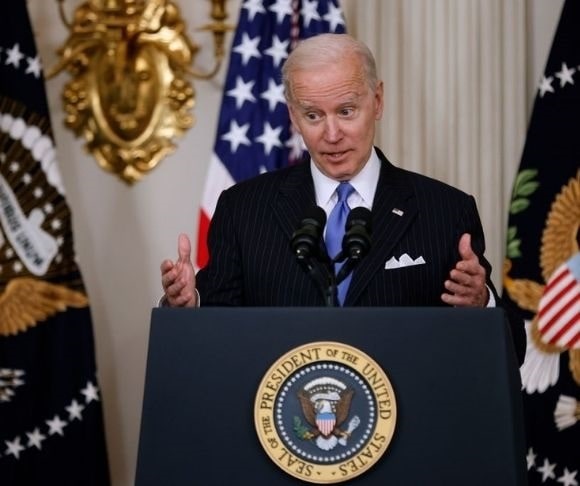The Biden administration has attempted to transmit the impression that it stands for strong defense, but its actions tell a different story. With the White House sending Congress the largest defense budget request ever at $773 billion, one might get the idea that maintaining a robust military capability to defeat near-term adversaries and deter future aggression from other global threats is a priority for the Biden national security team. But behaviors speak louder than words or budgets. Poor decisions regarding where to put the military dollars are making the US weaker. The Biden administration has consistently worried more about how its policy decisions look than what they achieve. Caving to what might upset Russia appears to be a hallmark of the administration’s feckless defense policy.
Nuclear Capability
By almost any standard, the US is the most powerful nuclear nation. That standard has allowed America to deter foes from shakedowns that attempt to bend the US to their way of thinking. Russia’s invasion of Ukraine and Vladimir Putin’s threats of going nuclear are the most recent concerns. “Russia’s nuclear arsenal and strike capability provide Russia an opportunity to remain an enduring, existential threat to the United States, our Allies, and our Partners,” General Tod Wolters, US Air Force commander, European Command, told the House Armed Services Committee. “A central concern is Russia’s non-strategic nuclear weapons stockpile and the Kremlin’s potential to use these weapons in crisis or conflict,” Wolters explained.
Countering a nuclear attack on the US with a flexible variety of response alternatives is all about the nuclear triad. By having a modern fleet of bombers like the B-2 Spirit, submarine-launched tactical cruise and intercontinental-range ballistic missiles, and land-based intercontinental ballistic missiles like the Minuteman III, the Defense Department has a range of options. Furthermore, that array greatly complicates an adversary’s targeting, leaving any foe vulnerable to retaliation. However, the Biden administration is in the process of putting existing US deterrence capability at risk.
Two of the more potent weapons in the triad arsenal are on the president’s chopping block. The White House has decided not to support the submarine-launched nuclear-tipped cruise missile (SLCM-N) program and to scrap the nuclear gravity bomb dropped from nuclear-capable bombers like the B-2 and newer B-21 under development. The B83-1, as the atomic bomb is designated, is the only weapon of its kind that can reach deep into underground bunkers where an enemy would have its command-and-control facilities. “The decision to cancel the weapon carries what defense officials say is the increasing challenge for US planners to deter nuclear adversaries like China, North Korea, and Russia. All three states are expanding their nuclear forces with the addition of new strategic weapons and warheads,” Bill Gertz wrote in The Washington Times.
Key military leaders and legislators did not universally welcome this move. As Politico reported recently:
“A pair of four-star officers have already backed the cruise missile. Rep. Doug Lamborn (R-CO) noted that Adm. Charles Richard, head of US Strategic Command, sent lawmakers a letter recommending the weapon [SLCM-N]. Gen. Tod Wolters, head of U.S. European Command told the committee last week that he agreed with Richard’s assessment in support of the weapon.”
Even the chairman of the joint chiefs of staff, US Army General Mark Milley, who is generally in lockstep with the administration, said in recent testimony before Congress that his views had not changed from his support for the SLCM-N. “Milley has previously backed new weapons proposed by the Trump administration’s 2018 nuclear blueprint,” Politico reported recently. During his 2019 confirmation process, Milley said he believes the 2018 proposals “are necessary to enable our flexible and tailored deterrence strategy.”

Joe Biden (Photo by Chip Somodevilla/Getty Images)
A Policy of Weakness?
But the White House is on a different page, not necessarily one focused on the threat posed by Russia, China, and North Korea. Furthermore, recent actions on the part of the Biden national security team call into question its will to take on America’s adversaries. For example, a scheduled test of a US hypersonic weapon was successful, but “the Pentagon chose not to announce the test of the Hypersonic Air-breathing Weapon Concept, or HAWC, for about two weeks to avoid inflaming already-delicate tension with Russia,” an official told Defense News. Similarly, a test of a Minuteman III was postponed in early March 2022 because the “Pentagon wanted to avoid any possible misunderstanding over the Minuteman test.”
The Biden administration reducing nuclear capability by eliminating effective weapons will likely be viewed by US adversaries as unilateral arms reduction and adopting a policy of weakness – no matter how large a defense budget the president proposes.
The views expressed are those of the author and not of any other affiliation.




